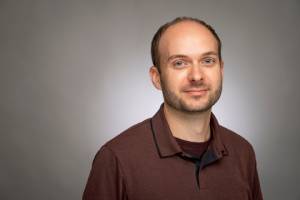Lars Plate, assistant professor of chemistry and biological sciences, is on a team that won $55,000 from Scialog’s initiative, Chemical Machinery of the Cell. The award—one of 24 granted to 21 researchers in the U.S. and Canada—will enable Plate to pursue collaborative research to advance fundamental understanding of chemical machinery and reactions in intact cells.
Scialog’s name is a mélange of the words science and dialogue. It was established in 2010 by the Research Corporation for Science Advancement to support research by stimulating intensive interdisciplinary conversation and community building around a scientific theme of global importance. Teams of two or three researchers who have not collaborated previously can compete for seed funding for high-risk, high-reward projects based on the innovative ideas that emerge at various conferences.

“The Scialog workshop was fantastic for connecting with other early career researchers from divergent disciplines and brainstorm collaborative research ideas,” Plate said. Plate will work with Caitlin Davis, assistant professor of chemistry at Yale University, on their project, “Structure-Function of Enzyme Filaments: Regulators of Cell Metabolism in Space and Time.”
Dynamic protein-protein interactions govern many processes in molecules, cells and organisms. When these interactions are altered, they can instigate the growth and spread of disease inside the body. Plate’s lab aims to define the dynamics and the coordination of these protein interaction networks in various processes.
“Pooling chemical biology knowledge from my lab with spectroscopy and imaging expertise in the Davis lab, we look forward to investigating the reversible assembly of metabolic enzyme complexes and their role in metabolic diseases,” Plate said.
Toward this goal, Plate has developed new mass spectrometry-based protein and chemical biology tools. By leveraging multidisciplinary approaches to protein biochemistry, enzymology and cell biology, Plate’s research plays a significant role in scientists’ understanding of disease and subsequent drug discovery.
The award itself is distributed through Scialog and funded by the Research Corporation for Science Advancement and the Gordon and Betty Moore Foundation. “The purpose of Scialog is to launch multidisciplinary collaborations between early career researchers who have not previously collaborated to pursue novel lines of research,” Senior Program Director Richard Wiener said in a release. “These teams’ initial research positions them to be competitive for further significant funding from federal agencies or private philanthropies.”
About Research Corporation for Science Advancement
Research Corporation for Science Advancement, founded in 1912, is a private foundation that funds basic research in the physical sciences (astronomy, chemistry, physics and related fields) at colleges and universities in the United States and Canada.
About the Gordon and Betty Moore Foundation
The Gordon and Betty Moore Foundation fosters pathbreaking scientific discovery, environmental conservation, patient care improvements and preservation of the special character of the Bay Area.